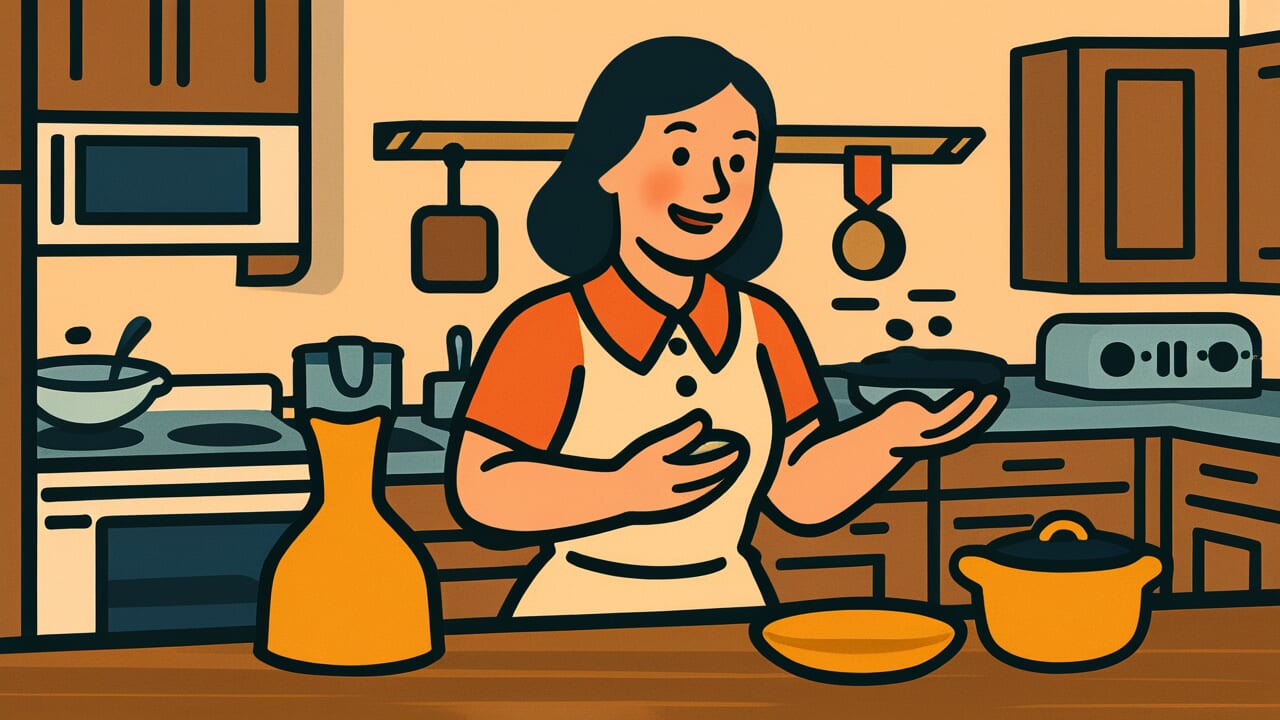How to Read “Choose a wife from the kitchen”
Nyōbō wa daidokoro kara morae
Meaning of “Choose a wife from the kitchen”
This proverb means you should choose a wife who is skilled at cooking and household tasks. When deciding on a marriage partner, you should value abilities in kitchen work and general housekeeping, not just appearance or social skills.
The saying is based on the idea that watching someone work in the kitchen reveals important qualities. You can see their life skills, planning ability, and diligence—traits that matter when sharing daily life together.
Preparing daily meals directly affects the family’s health and happiness. This is important work. Knowing if you can trust someone with this task leads to a successful marriage. This is practical wisdom.
Today, ideas about gender roles have changed. But this proverb contains a universal truth. When choosing a life partner, don’t overlook the importance of practical daily skills.
Origin and Etymology
There are no clear records of when this proverb first appeared in writing. However, looking at how the phrase is structured reveals an interesting background.
The expression “choose from the kitchen” suggests you should judge a potential spouse by watching how they work in the kitchen. In old Japanese society, people had chances to observe how someone behaved at home before marriage. The kitchen was seen as the place where a woman’s practical abilities showed most clearly.
The kitchen was more than just a cooking space. It was the center of household management. How someone chose ingredients, cooked without waste, and preserved food showed their wisdom and skills in managing all aspects of life. Daily meal preparation was vital work that affected the family’s health.
This proverb expresses a practical view of marriage. It values the ability to support daily life over flashy appearance or social behavior. The saying likely came from a time when people, especially in farming villages, emphasized the family as a community living and working together.
Usage Examples
- He’s about to decide on marriage based on her glamorous looks, but as they say “Choose a wife from the kitchen”—I think he should look more at her life skills
- “Choose a wife from the kitchen” is well said; thanks to my wife’s cooking skills, our family is healthy and happy
Universal Wisdom
This proverb has been passed down through generations because it touches on a universal truth. People tend to overlook the importance of everyday life.
When we’re in love, we’re captivated by our partner’s attractive qualities. Their smile, the way they talk, fun times on dates. But most of married life isn’t made up of these special moments. It’s the ordinary days that repeat themselves, from morning to night.
The accumulation of plain, unremarkable hours is what life is really about.
Our ancestors deeply understood this “weight of the everyday.” They knew that 365 days of meals matter more than a few celebrations each year. How someone works in the kitchen when nobody’s watching matters more than how they behave at glamorous social events. They saw that a person’s true nature appears in these moments.
The kitchen is symbolic because it’s where “life’s reality” is most concentrated. It takes ingenuity to feed a family on a limited budget. It takes wisdom to plan meals that don’t get boring. It takes care to balance nutrition for health.
Planning, creativity, compassion, patience—all the important human qualities appear there.
Everyone lives far more ordinary days than shining moments. That’s why choosing a partner who can enrich those ordinary days leads to a happy life. This proverb contains a deep understanding of human nature.
When AI Hears This
Economist George Akerlof analyzed the used car market and proved something important. When only sellers know the quality and buyers don’t, bad products dominate the market. This is called the “lemon market” theory. Marriage actually has the same structure.
In arranged meetings or short courtships, you can’t see a person’s true character or life habits. Everyone tries to show only their good side.
What’s interesting about this proverb is its focus on a specific place—the kitchen. The kitchen is the most “impossible to fake” space in a home. Standards of cleanliness, how someone handles ingredients, how well they organize tasks, how much they waste.
These things come from long-term habits that appear unconsciously. You can’t fake them for long. In economics, such observable behaviors are called “signals.” Just as education signals ability, kitchen behavior signals overall life skills.
Even more important is the observation period. Working as a household servant typically lasted several months to years. This length is perfect. Psychology research shows people can keep up an act for about three months, but their true nature starts showing after six months.
The time spent working in the kitchen was long enough to gather statistically reliable information.
Information asymmetry is a serious problem in today’s marriage market too. Profiles can be edited. Everyone puts on a good face during dates. This proverb teaches a universal principle for making important decisions. Always gather “observable and hard-to-fake information” over a sufficient period.
Lessons for Today
This proverb teaches us to focus on people’s “everyday selves” when judging them. Are you judging someone only by their shining moments on social media or special times on dates?
What really matters is a person’s essence that appears in ordinary, casual actions. Do they keep promises? Do they value time? Do they spend money wisely? Do they notice when others are struggling?
The accumulation of these small daily actions reveals who someone truly is.
This isn’t just about romance or marriage. It’s the same with friendships and work partners. Someone who steadily handles mundane tasks matters more than flashy presentations. Someone who keeps small daily promises matters more than spectacular achievements.
These are the people who become trustworthy over long relationships.
Most importantly, this proverb is a question for ourselves. Who are you when nobody’s watching? Your true value appears in your small daily actions.



Comments